Review
English_Displaced people, who have been away from their homes, celebrate the Chuseok holiday
- WRITER유예은
- DATE2016.09.22
- COUNT702
Displaced people, who have been away from their homes,
celebrate the Chuseok holiday
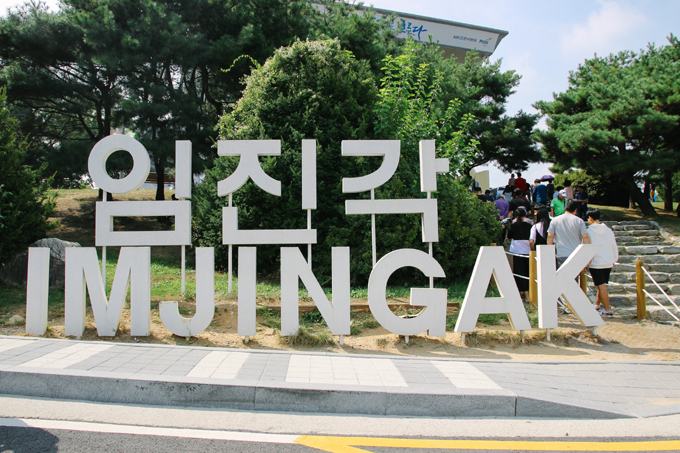
On the morning of September 15, 2016, the Chuseok holiday, Imjingak Pyeonghwa Nuri Park in Paju, Gyeonggi-do.
A group of people shed tears during the ancestral memorial service. North Korea used to be their home, where they have left behind their families. At the memorial rite during the Chuseok holiday, DMZ peacekeepers shared the sorrow of the displaced people who have been away from their homes for more than 70 years.
Tearful bows: “I just want to know whether my family has survived or has died.”
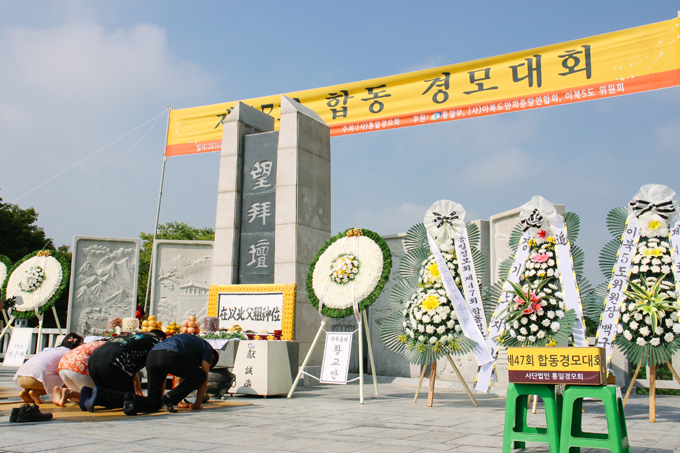
The Imjingak memorial altar, which is erected towards the North, featured a table filled with well-prepared memorial foods. People queued, laid a white chrysanthemum on the altar, and poured a cup of wine in memory of their ancestors. They made two deep bows, held a moment of silence, and sobbed quietly.
This joint ancestral rite was sponsored by the Ministry of Unification, was organized by the Unification Appreciation Association, and was prepared by the Joint Hometown Appreciation Group. The event was devoted to the displaced people. As far back as in 1979, the first generation of displaced people established the Unification Appreciation Association, and held the first joint hometown appreciation rite. This year marks the 47th anniversary of their organization on Chuseok holiday (source: Unification Appreciation Association’s Nurijip). Every year, a large number of displaced people get together at Imjingak to hold a memorial service during the Chuseok holiday.
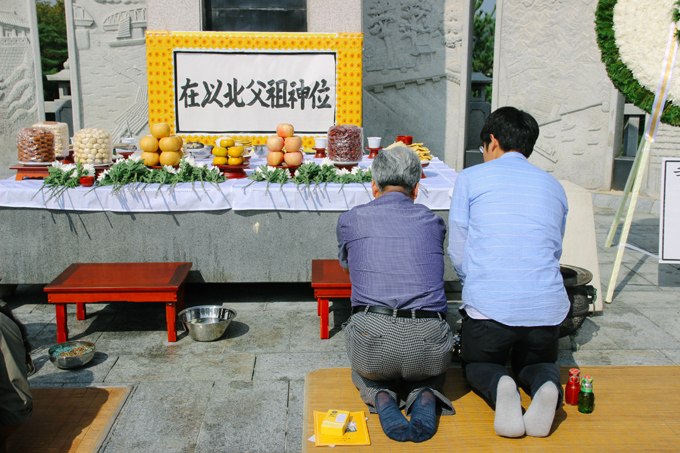
O Hwan-gi (pseudonym, 85) is one of those displaced people who visit Imjingak every year. Until just a few years ago, he would be there with his wife, but her health has since worsened, leaving him to make the trip alone. He pointed at the mountains of North Korea, beyond the memorial altar, and said: “Over there, there is my hometown, and my family who was left behind.”
O Hwan-gi made two big bows towards the north, and closed his eyes pensively. His memory of leaving his hometown as a 14-year-old boy is still vivid. In Hwanghae-do, he escaped the war and hurriedly boarded a boat with only his schoolbag. He was with his parents, and his uncle’s family.
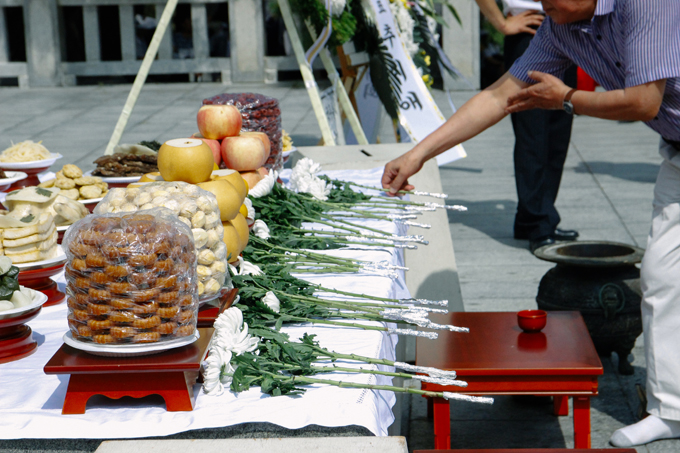
They rowed the boat for quite a long time and arrived at what was found to be Deokjeok-do, where there were many refugees. They received relief food, which proved scanty compared to the vast number of refugees. O Hwan-gi remembered: “So starving, I picked and ate sweetbrier blooming at the seaside. My uncle, who went back home in a boat to get rice, never returned.”
“My uncle had two daughters, who were three or four years younger than I. They would now be in their 70s. They would remember my name, although they would not recognize my face. I am very eager to meet them if they are still alive.”
His heartbreaking sorrow was felt as he visited the Imjingak memorial site to witness a rite at a place that was a little closer to his hometown in North Korea. Every displaced person at the memorial altar is in deep, heartbreaking sorrow.
At Imjingak, which is closer to North Korea,
the displaced people send out their greetings to the north.
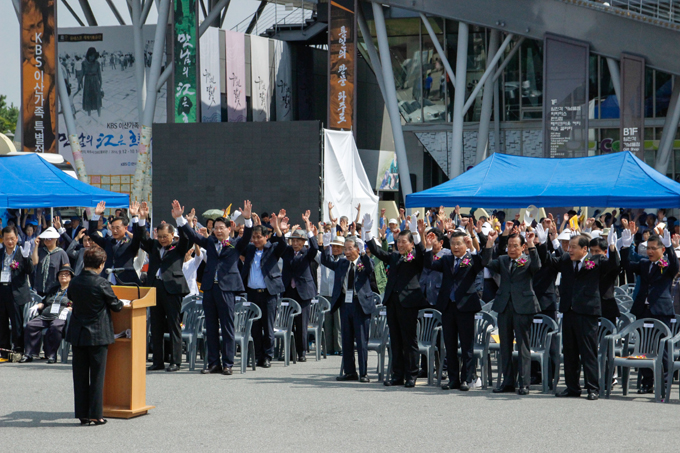
Attending the day’s event were personnel from the Unification Appreciation Association, the Ministry of Unification, and the Displaced North Korean People Association, as well as a vast number of displaced people. Nam Gung-sang, Chairman of the Unification Appreciation Association, said: “Many of the displaced people are now in their 70s and 80s. Every year, the number is declining, and their memories of their hometowns are fading. The failure of a reunion, if only cherished and not fulfilled, is too sorrowful for these displaced people.” He wished for a hassle-free travel between South and North Korea as soon as possible.
Kim Hyung-suk, the Vice Minister of Unification, said: “Families and relatives naturally want to be reunited. Thus, the government is putting the reunion of these displaced people as its first priority. We will survey the status of dispersed families, and devise a policy on the matter.”
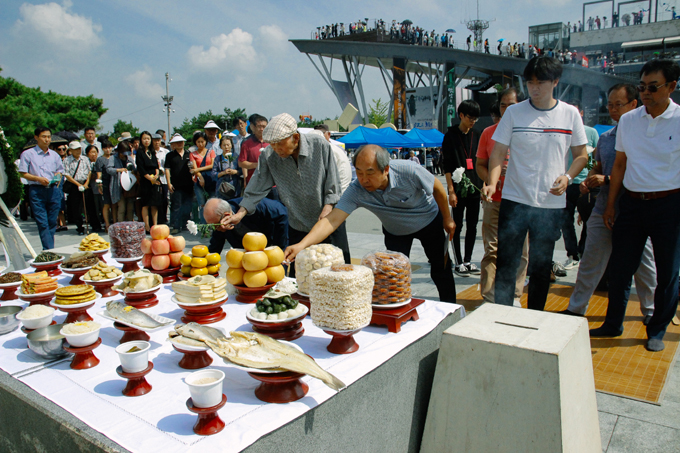
At the altar, displaced people and visitors formed a long queue. Though it was unusually hot, everyone patiently waited in line.
Displaced people poured a glass of wine in memory of their ancestors and their families in North Korea in the hope of healing their heartbreaking sorrow. We strongly wish for a reunion of displaced families in South and North Korea before it is too late. Until the union, displaced people will gather at Imjingak to hold ancestral memorial services to celebrate their hometowns.
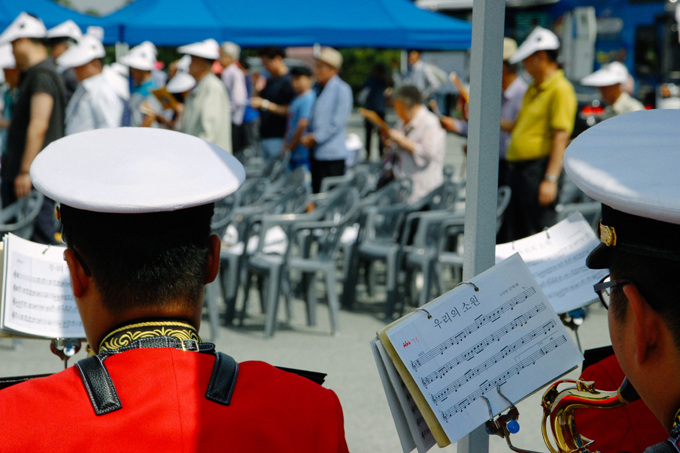
유예은
2016.09.22
comment
- tistory
- naver
- daum
- Operation rules
- We have several rules that is needed to maintain a good community. If we have determined that you have written an article that violate the rules, then we do not notify you, and immediately we can delete the article.
- Criteria to delete the post.
-
- The act of spreading private information (name, company name, private photos, phone number, Social Security Number, etc) or continuing to write a great number of post or comments.
- Posts to blame or insults others.
- Pornography posts or inappropriate posts for the youth.
- Posts that is different from the service purpose.
- Defamatory posts, such as to blame others or to spread false information.
- Posts that violate the relevant law such as Copyright Violation.


